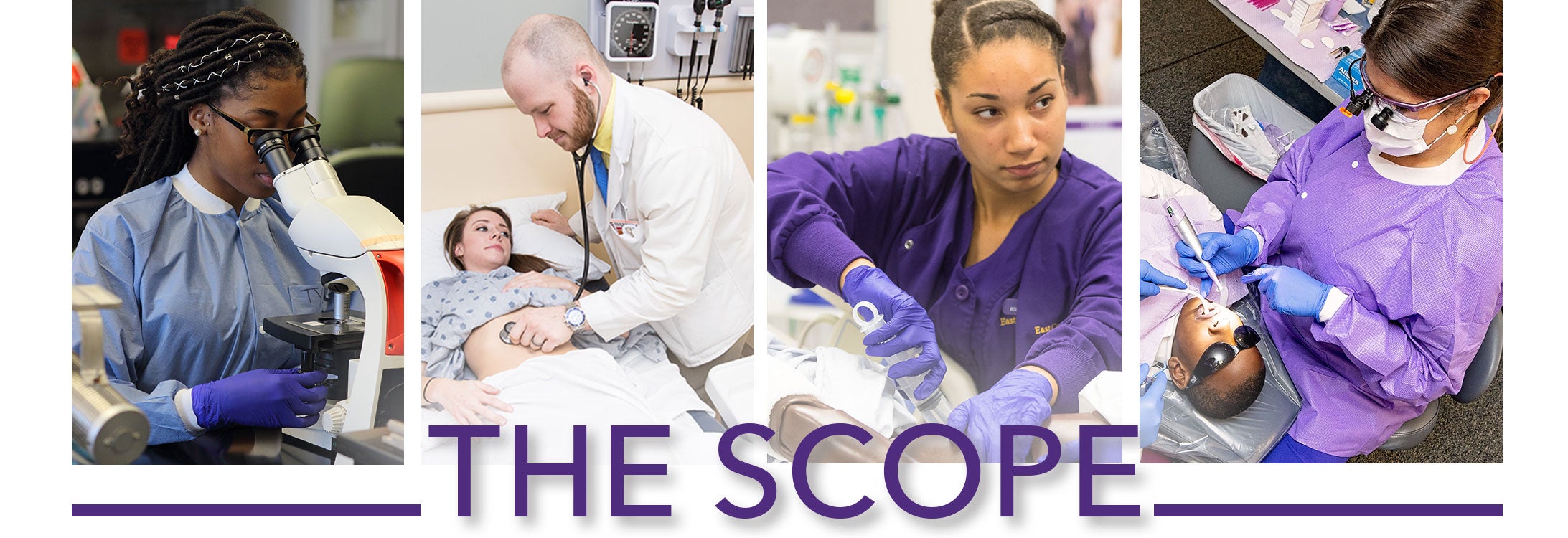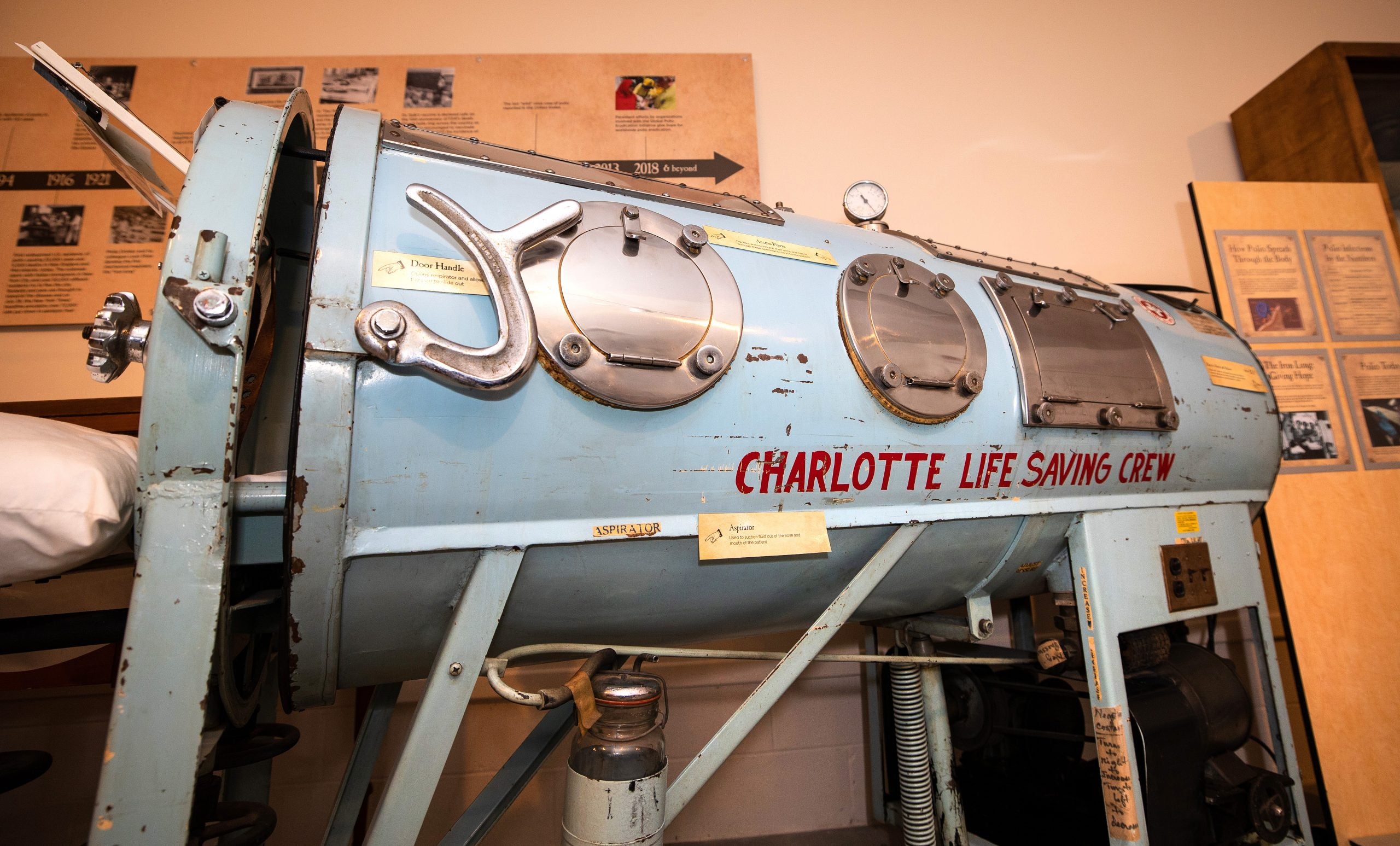July 2021
Welcome to “The Scope,” the newsletter of the ECU Division of Health Sciences.
Welcome to the July 2021 issue of The Scope, the newsletter of the ECU Division of Health Sciences.
From time to time, I’ll ask another leader, provider, educator or other notable member of the DHS community to share a message with you as we celebrate the month’s accomplishments and highlights. This month, we hear from Dr. Michael Waldrum, dean of the Brody School of Medicine and CEO of Vidant Health.
Dr. Ron Mitchelson
Interim Vice Chancellor, Division of Health Sciences
Greetings Colleagues,
It is an exciting time at the Brody School of Medicine as we build on the rich mission and accomplishments that are so important to our state, eastern North Carolina and ourselves. As we work with the dedicated team of health care educators, providers, students, residents and staff whose talents and skills have created this great organization and make a difference every day for health care in the East, we are charting the course to a vibrant future.
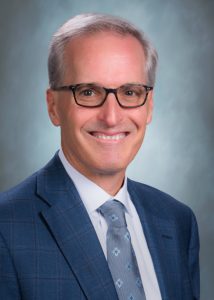
Dr. Michael Waldrum, Dean Brody School of Medicine
As we approach the clinical integration of the Brody School of Medicine and Vidant Health, it is clear that our missions are aligned and we will be stronger together to address our educational, research and care objectives
Both serve as major employers across the region; contribute to local and regional economies; offer services and resources for patients in rural and underserved areas and partner with agencies in efforts to bridge health care gaps and disparities. Both organizations have pledged their purpose to the people of eastern North Carolina—from coastal towns and county seats to rural communities and remote areas where people do not have adequate access to quality care. We have many examples of using our complementary strengths together to support our communities. As we look forward and chart the next steps of integration, it will be based on a common commitment to serve what is arguably the state’s most complex region.
While there are still many unanswered questions and uncertainties that come with clinical integration, we will work together to discover the answers and accomplish our goals. These goals are clear and include providing the highest quality care for our patients and communities, addressing health inequities, preparing physicians and other professionals to practice in an integrated academic health system and expanding and improving our research enterprise.
In essence, our goal is to build a regional integrated academic population health company that drives value to our region, ECU and each of us. Importantly, we need you and others to help with this critical work and with a common brand, we will look to enhance the recruitment and retention of talented health care professionals, educators and researchers.
This new arrangement, to put it simply, makes sense. It is what health care needs and is where medical education, research and delivery are going. It plays to our strengths and builds on the foundations that both Vidant and ECU have created together.
The creation of a better organization offers an exciting assortment of possibilities—ones that will challenge each of us to put forth our best every day. Creating our future together is no small task, but it is vital to each of us and our region. I know we are up for building that brighter future, as each of us is here because we believe in a collective mission—a mission of improving health and quality of life for the people who make our region what it is: hardy, determined and resilient. Our passion is health care, and it benefits our constituents now to create a system that offers more comprehensive services to patients who have built trust in our individual brands. The effectiveness of a successful integration will help create new ways to care for the patients we serve and will enhance our educational and research efforts.
Like its people, our region is known for overcoming hardships and for ingenuity—for sharing ideas and expertise that ultimately instill in our neighbors hope for a better future. There is historic value—and a carefully crafted foundation—in where we have come from: a hospital system that rose in the East and met a medical school determined to transform a region through health education. Now more than ever, we will call upon you to put forth the best of what you bring to the table in your respective roles. You are the heart, mind and soul of our partnership, and I look forward to witnessing you thrive and grow as our organization progresses as one better, stronger entity.
This moment will yield a future that is bright. I look forward to this journey of compassionate and cutting-edge care for eastern North Carolina, building and expanding the future medical education and interdisciplinary education capabilities and invigorating our research endeavors. Working together, we will overcome the uncertainties and create that bright future.
Respectfully,
Michael Waldrum, MD, MSc, MBA
Dean, Brody School of Medicine
Education
The East Carolina University College of Nursing will offer four new courses in Healthcare Emergency and Disaster Management beginning in Fall 2021, making ECU the first university in the state to offer this kind of training.
The graduate-level courses are aimed at expanding nurses’ knowledge of emergency management and disaster preparation, response and recovery. The specialized instruction in these areas will prepare advanced nurses to lead communities and health care organizations to quickly find solutions and reduce suffering in the event of natural disasters, bioterrorism attacks, mass casualty events and pandemics.
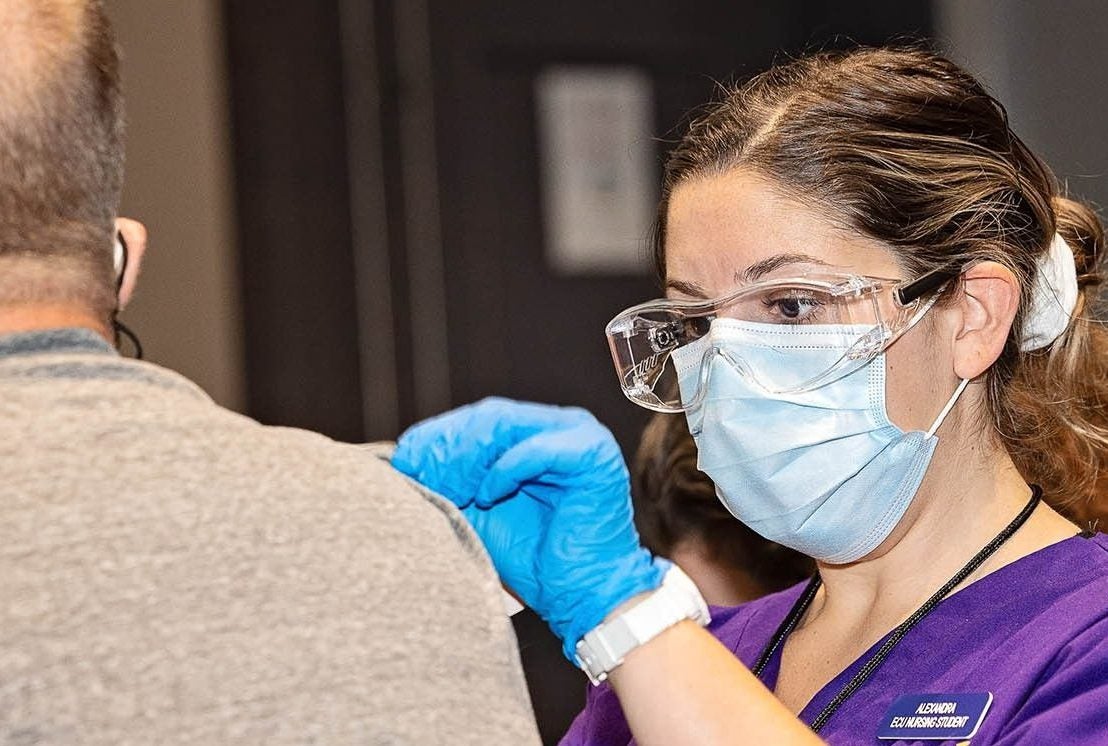
ECU Nursing student Alex Yllanes gives COVID-19 vaccines during a clinic event at the Greenville Convention Center March 23, 2021. (ECU Photo by Cliff Hollis)
“North Carolina is no stranger to disaster, and it is time for the ECU College of Nursing to take a leadership role in collaboration with other disciplines in responding to disasters with the education, training and certification to effectively respond,” said Dr. Robin Webb Corbett, chair of the Department of Advanced Nursing Practice, who will be among the faculty teaching the new courses.
The new courses being offered are:
- NURS 7900: Introduction to Healthcare Emergency and Disaster Management
- NURS 7910: Healthcare Disaster Preparation, Response and Recovery
- NURS 7920: Role of Nursing in Disaster Response
- NURS 7930: Interprofessional Global Disaster and Humanitarian Response
The courses are open to nurses in any of the college’s graduate programs, as well as non-degree seeking nurses who have attained at least a BSN degree. One course will be offered each semester. Although the courses are currently only available to nurses, faculty hope to eventually expand their reach and offer them to students in other health care disciplines as well. The college is also pursuing a certificate program based around the courses.
Upon completion of the 7900 and 7930 courses, nurses will be eligible to take the American Nurses Credentialing Center (ANCC) National Healthcare Disaster Professional certification exam.
The COVID-19 pandemic provided the most recent evidence that this type of instruction is crucial for health care providers. But faculty at the College of Nursing—many of whom have significant experience in disaster relief through health care, military and community leadership—have been working toward providing more opportunities like these for years.
Service
Dental student Octavia Miller received a national Audacity to Dream Award for Community Service during the Student National Dental Association’s annual conference. Miller plans service projects for rural communities and offers materials and resources about oral health care and dental hygiene for children.
Miller is a 2014 graduate of ECU and a first-generation college student. She plans to practice dentistry in her hometown of Warsaw in Duplin County or another small rural community. She said the School of Dental Medicine has encouraged her volunteerism, which has been a vital part of her education.
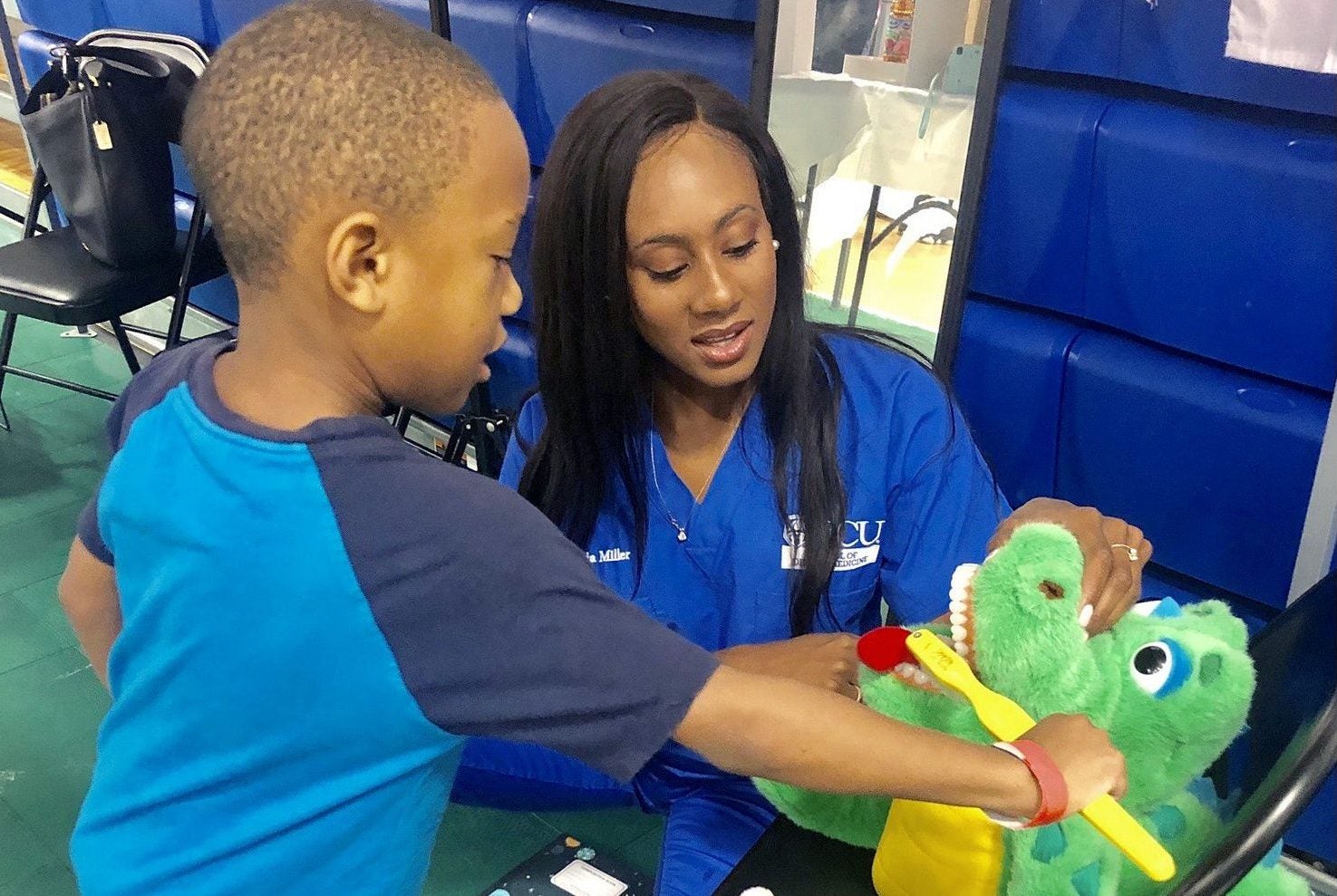
Miller provides education and resources to children as part of her community outreach and community service projects. (Contributed photo)
To reach as many people in rural communities as possible, Miller researches events that are already planned in those areas and asks about setting up a dental education booth. On the day of the event, her booth is colorful and inviting, featuring free toothbrushes, toothpaste, floss, resources and even conversations with children on their future careers. She wants them to learn early on that their dreams are within reach.
“I ask them what they want to be when they grow up,” she said. “Plant those seeds, and maybe they’ll grow.”
During her undergraduate career at ECU, Miller was a first-generation college student with a profession in health care in her sights. She had long been interested in dentistry, but she wavered every time she wondered if she could take on the rigors of dental school. She majored in health services management and business administration, knowing that she could opt to run a nursing facility, paralleling her mother if dental school didn’t pan out.
Miller continued to mull over her options, knowing that whatever path she chose, it would be with home in mind.
Warsaw, an hour and a half from Ross Hall on ECU’s Health Sciences Campus, is a small farming community that contributes to the meat industry within the wider stretch of Duplin County. That setting taught her the value of hard work and hardiness. She worked five jobs — from retail to home health care — to pay her way toward her undergraduate degree.
“I learned that I have a work ethic and I don’t mind working hard, and it taught me leadership,” she said. “I also learned to roll with the punches. If you have a bad day, sleep it off and come back swinging.”
Miller has taken that determined edge along for the ride during her dental school journey, to the point where she is considering how she can best serve through dentistry after graduation.
“I’m thinking about going straight into practice either back home or a place like home,” she said, her eyes lighting up. “In the future, I would love to run a mobile dentistry unit that is specifically tailored to the elderly. We have older people who need us, and if I could set up in neighborhoods and care for them, it would be amazing.”
History & Health Care
The Country Doctor Museum has now re-opened, featuring artifacts and exhibits that show visitors the way health care in the East evolved over time. The museum is the country’s oldest museum dedicated to rural health care.
Before closing because of the COVID-19 pandemic in March 2020, the museum experienced a steady flow of visitors. While it was closed to visitors, staff took inventory of artifacts and exhibits to ensure the museum’s offerings would be better than ever once it could reopen.
Country Doctor Museum staff presented virtual programming to middle-school students, conducted a virtual tour and Q&A session with ECU students and trained interns to help with collections management and installing museum displays in the halls of the Brody School of Medicine at East Carolina University.
“A bright spot throughout the pandemic was our work with students, either remotely or in-person,” said Annie Anderson, the museum’s director.
Some of the museum’s displays offer a view of life during past pandemics and disease outbreaks.
“The museum’s ‘Sick Room: Home Comfort & Bedside Necessities’ exhibit speaks to the care of ill family members, and some of it is applicable, whether it was in the early 20th century or today,” Anderson said. “During the tour, we discuss with our guests how people washed their hands more frequently or covered their cough as they learned how illness was spread. It seems we became more fully acquainted with these types of preventative measures during the past year.”
Anderson added that images housed in the museum draw connections between ways people tried to prevent disease over the years, even as knowledge and capabilities have evolved.
“We also have a great image in the sick room of trying to keep the germs of various illnesses out of the home,” Anderson said. “It reminds me of how families were wiping down groceries and other cleaning hacks to prevent COVID-19 from entering their homes. I think the care and concern families have for their sick loved ones remains constant through time, although the technology to care for them changes.”
DHS Spotlight
In the spirit of excellence in education and a collaborative campus, we will highlight a variety of students, staff and faculty who represent the colleges and schools in the Division of Health Sciences.
This month, we meet Dr. Denise Donica, associate professor and chair of the College of Allied Health Sciences’ Department of Occupational Therapy.
Dr. Denise Donica doesn’t live in the negative. Positive outcomes fuel Donica, an associate professor and chair of the Department of Occupational Therapy.
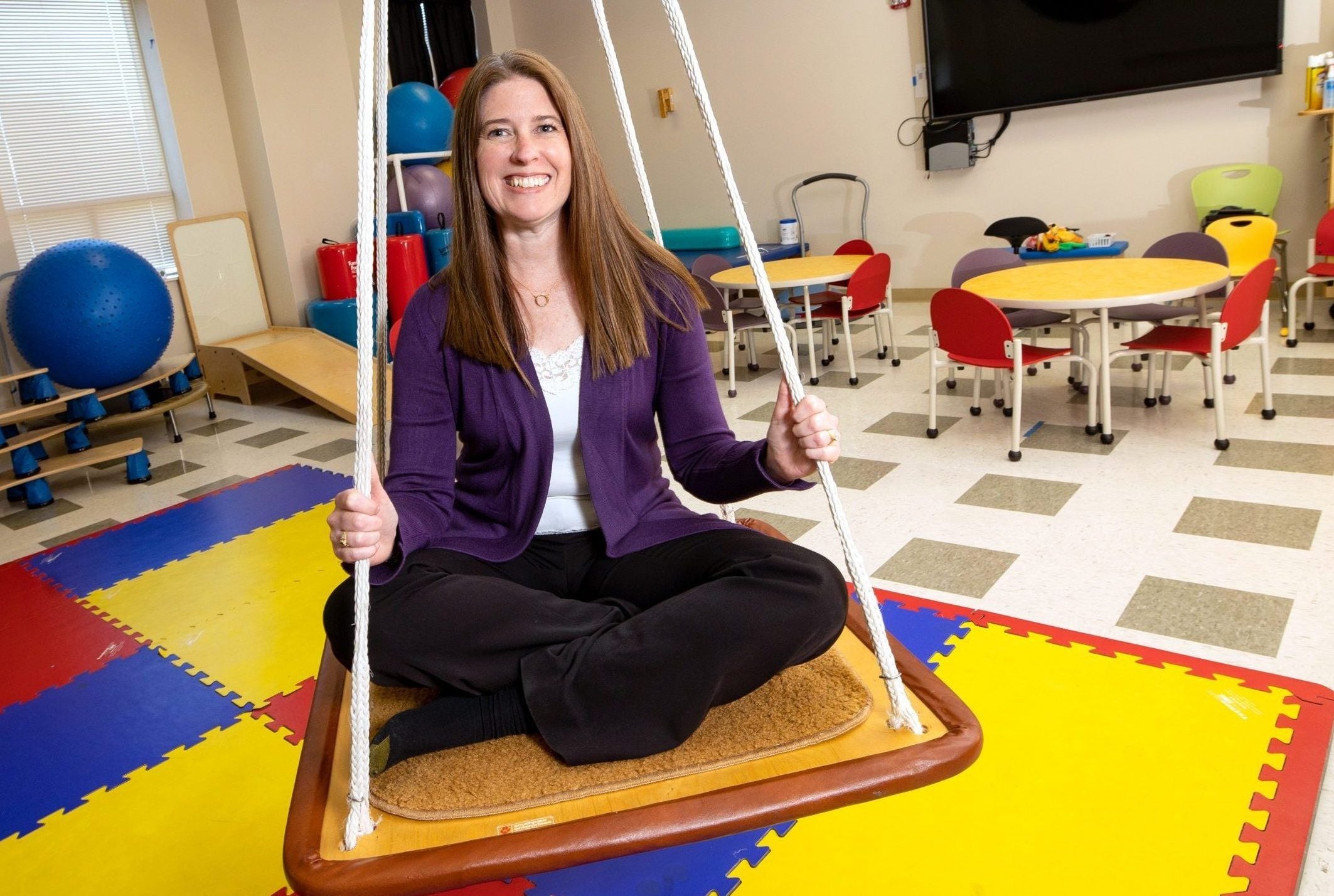
Denise Donica, Associate Professor and Chair Department of Occupational Therapy, sits on a swing in a pediatric focused lab on the Health Science campus. (Photo by Rhett Butler)
“The goal of occupational therapy is to help people to accomplish the tasks they want or need to do every day,” she said. “We are the problem-solvers who help people turn ‘can’t’ into ‘can and do.’ Occupational therapy is a valuable service for individuals from birth to end of life through various practice settings — from medical settings such as hospitals and long-term care facilities to rehabilitation centers, to schools, to community-based sites, to industrial rehabilitation and beyond.”
Donica grew up in Anderson, Indiana, a city she described as a factory town of about 55,000 people. She was involved in her church and enjoyed her days at Highland High School, where she was a majorette in the Marching Highlanders band.
She decided to major in psychology at Indiana University but a conversation with a friend’s father pointed her toward occupational therapy.
“I have always been interested in teaching since I was little,” she said. “I remember playing school with my friends. I loved having worksheets to give to my ‘students’ and I loved grading their papers.
“As an occupational therapist, educating clients and their families is a critical component, so I continued my love for teaching through my chosen profession as an occupational therapist. I knew when I was in occupational therapy school that I wanted to teach one day. My goal was to practice for 10 years and then go into academia. I ended up practicing full time for eight years before moving into academia full time. I got close.”
While at ECU, Donica has focused her research on the written communication skills of elementary-aged students, looking at handwriting and more recently keyboarding skills, and the handwriting curriculum developed by an occupational therapist called Handwriting Without Tears.
“Outcomes of my research have helped inform occupational therapists what strategies and techniques may be beneficial to use with students in treatment who are struggling with these skills,” she said.
Philanthropy
In a picturesque setting with the signature outdoor features of eastern North Carolina — water, pines, a stretch of blue sky — children living with health care challenges are experiencing summer camp.
After a hiatus last summer because of the COVID-19 pandemic, the camps designed for children with specific health conditions once again served their eager clientele through experiences that mirror routine summer camp. While the campers get to make friends and enjoy outdoor adventures and activities, they do so under the care of expert health care providers.
The camps are housed in the Department of Pediatrics in the Brody School of Medicine at East Carolina University, with support from the ECU Medical & Health Sciences Foundation.

Children ages 8 to 14 with Type 1 diabetes attended Camp Needles in Blounts Creek on July 24-25. Contributed photo.
Camp Needles in the Pines welcomed back children ages 8 to 14 with Type 1 diabetes to Camp Boddie in Blounts Creek on July 24-25. Although abbreviated from its typical schedule, the camp still provided the campers the opportunity to enjoy activities such as swimming, sailing, canoeing, kayaking, archery, crafts, rifle range, tenting and improved self-help skills. Medical supplies such as insulin testing meters are provided through the camp for the weekend, and the medical staff consists of volunteers from the hospital, medical school and university.
Camp Rainbow, for ECU pediatric cancer, hemophilia and bleeding disorders patients, and Camp Hope, for the division’s sickle cell disease patients, were held in June. Jacque Sauls, director of Rainbow Services/Child Life for ECU Pediatric Hematology/Oncology, said those weeklong camps were limited to middle- and high-school-age campers, and campers stayed with their cohorts to minimize the chance of COVID-19 exposures. Along with additional safety protocols, those changes were enthusiastically incorporated, since it meant being able to host the camps after a historic closing last summer.
Sauls worked with ECU offices to develop safety protocols that followed state and national recommendations and policies, which included reducing camp capacity to 50%, requiring social distancing and staying with campers’ assigned cohorts and having a negative COVID-19 test three days before camp kicked off. Campers were also monitored throughout the camp duration.
She said financial gifts from donors in support of the camps extend beyond their initial value.
“The impact of one week of fun, friendship and specialized medical care for children and teens who attend Camp Rainbow and Camp Hope is a true investment in the lives of children with cancer, sickle cell disease, hemophilia and other chronic blood disorders,” she said. “In the words of our campers, we come to camp each year to meet old friends, make new friends and have fun with our doctors and nurses.”
To make a gift in support of any of these pediatric camps for children living with life-altering illnesses, email Missy Fallon or Jeff McPherson.
Learn more about how you can support the mission of ECU’s Division of Health Sciences through the ECU Medical & Health Sciences Foundation, Inc.
